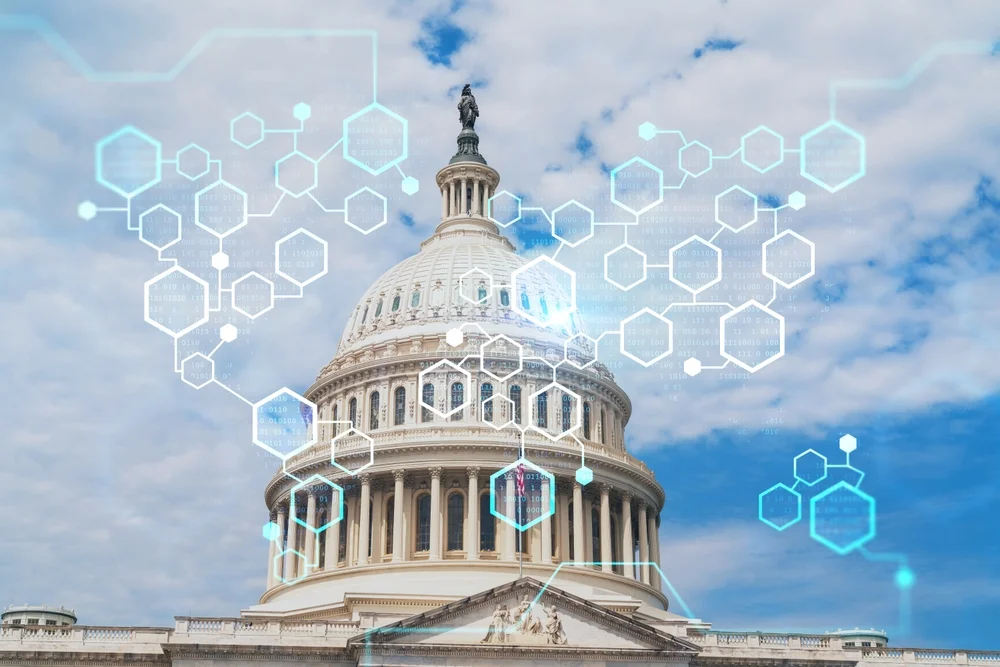
The GAIN AI Bill Is an American Loss
The House of Representatives should block an administrative colossus that could end American innovation in high-tech chips.
One piece of evidence for how far the United States has strayed from classical liberal principles comes courtesy of the U.S. Senate, which voted 77-20 to include in the National Defense Authorization Act the so-called “GAIN AI Act,” as in Guarding American Innovation in Artificial Intelligence. This new licensing scheme is yet another supposed effort to improve on the allocation of resources now determined by an open market. There is little dispute anywhere that the gains from AI count as a “transformative technology,” as that bill states. But there is no reason to assume that the development and use of AI technology should be guided by an America First approach that undermines our basic institutions and structure, which could slow down the technology process in the United States and worldwide.
To see why, note that the central provision in the GAIN AI legislation assumes that highly competitive markets are always misaligned when it comes to setting allocative priorities. The key provision in GAIN AI is an extensive licensing scheme that ensures, in the sale of sensitive technology, a statutory priority is given to domestic firms over foreign ones. The provision is not a general statement that can be blithely ignored, because it embeds these priorities in a vast administrative apparatus that explicitly gives all American customers a right of first refusal over the technology covered in the bill, which includes advanced artificial intelligence chips broadly defined. Historically, these rights of refusal are used in real estate transactions to allow, for example, a sitting tenant to purchase real estate within a short period of time at the price offered by an outsider, but only as part of a voluntary transaction. But in this context, the right is given by statute —not to a single person, but to any potential domestic purchaser of the technology — by law, not by contract. I am not aware of any voluntary transaction for chips and similar technologies that includes these terms for the simple reason that they are wildly inefficient.
It only gets worse. This nightmarish scenario requires an extensive investigation that starts by asking whether there is a “current backlog of requests from the United States,” which is hard enough to determine, given that the answer can vary over time, so that a backlog can exist at some times and not others. In addition, the backlog size is likely to vary over time. Hence, there is a second layer of review that asks if the government “cannot foresee” a future backlog. There is no clear definition of how detailed the vision must be, or whether it is a one-time judgment or an ongoing inquiry that could lead to last-minute breakdowns in completed sales contracts, leaving it to the contracting parties to sort out the risk of loss through litigation or complex contract provisions if the deal fails.
Next, the statute contains a provision that asks about “providing advantageous pricing” to foreign customers. This requirement creates an utter quagmire because business concerns may result in wildly different sales transactions to different customers based on the volume of chips sold, the service obligations connected with those chips, local taxes, regulations, and, of course, tariffs that influence the prices of these transactions. Accordingly, there is no uniform foreign per-unit reference comparable to domestic sales, which may exhibit different prices reflecting, among other things, local state laws that influence delivery, taxes, and regulations.
Last, there is the bizarre condition that “the circuit or product will not be used by foreign persons to compete with United States persons outside of the domestic home market of the foreign persons.” There are two potential scenarios, equally unsatisfactory. Under the first, the restriction is enforceable, which means that these components cannot be incorporated by any foreign competitor who sells, as does the United States, into the export market. This restriction thus requires these competitors to give up all the advantages of scale if they wish to include those chips in their new products, which, in turn, will reduce the price they are prepared to pay for production. That price adjustment could then easily trigger an investigation into whether the American company has offered “advantageous pricing” to a foreign competitor. The American company then might be allowed to show that the reduced price is commensurate with the restricted use. Under the second scenario, the restriction becomes unenforceable because the local purchasers of its products then turn around and sell them into some foreign market. That could be done by simple resale of the product as is, with or without the original manufacturer's knowledge. More likely, it could happen by making the particular item a component of a larger device sold in the export market.
It is important to set these statutory provisions against the reality of the marketplace. Computer chips have a very short half-life, so that such heavily scrutinized sales will not take place at all, given the pre-sale depreciation. The delays in sale, the higher inspection prices, the limited use, and the ex post government monitoring for violations under a set of regulations that will take years, not months, should be enough to kill the market under the guise of helping domestic producers. The supposed gain from this strategy is to ensure domestic firms continue to bolster U.S. leadership in AI by denying the best chips to our opponent. Fat chance. Americans for Responsible Innovation has argued that “it’s a badge of honor to put the U.S. first, as we work to keep the U.S. ahead on AI development, we need advanced AI chipmakers to sell to American companies before going to countries of concern.” The name of the organization is sufficient to condemn its basic mission, for the words “responsible innovation” are eerie parallels to “fair trade,” which conceal their overt protectionist motivation. The group then repeats the basic point in a joint letter with Oren Cass, another staunch protectionist, which claims “The GAIN AI Act is an America First pro-innovation, market-based approach intended to simultaneously address serious national security concerns.” And it offers no comfort that Senator Elizabeth Warren echoed this dangerous trend when she wrote: “Today, the Senate acted to make sure American customers — including small businesses and startups — aren’t forced to wait in line behind China’s tech giants when purchasing the latest AI chips.”
It is all a jumble of double talk. Anything that is America First is anticompetitive, and for what? The key point here is that Nvidia’s new Blackwell line of chips has been booked out twelve months in advance. But that fact is hardly sufficient to require Nvidia to breach those contracts to service American companies first. Instead, the far more sensible approach is to encourage Nvidia either to expand its capacity on the one hand, or to enter licensing arrangements with domestic or foreign companies to reduce the gap. While the GAIN AI Act recognizes the fact that today's demand exceeds supply, the best response is to boost capacity both domestically and overseas. The most likely consequence of GAIN AI’s ersatz restrictions will be to reduce the amount of free capital available for investment, given the evident shrinkage of the market for these chips down the road. Nvidia was right when it concluded that GAIN AI will wreck the international market to solve a domestic problem that does not exist.
As the final straw, the so-called national security argument for GAIN AI is wildly overplayed. There is, of course, every reason to impose serious export controls on specific avionics or other purely military materials to ensure they do not fall into enemy hands. But these general purpose chips could be used for any purpose under the sun, so if national security is a legitimate concern here, then the path is wide open, as I recently argued, for a protectionist path that makes all exports and imports subject to nonmarket constraints that beggar both the United States and all its trading partners.
Unfortunately, GAIN AI is highly likely to aggravate the problem by reducing the capital available to successful domestic firms like Nvidia to produce their next-generation chips. And it will encourage further bailouts of struggling domestic firms like Intel, whose problems stem from internal issues, not local or global market conditions. Worse still, this retrograde legislation will encourage China and other countries that now rely on American chips to increase their domestic investment in designing and producing rival chips, which, in the end, will subsidize competitive moves by countries like China that are now our customers. But one can look far and wide among the simplistic statements of GAIN AI supporters to see whether they address any of the technical difficulties posed by the licensing regime this statute will foist upon an unsuspecting public. This statute is yet another chapter in the protectionist regime that populist Republicans and Democrats alike are building, in ways that will undermine the advantages of a free and open economy that once welcomed foreign cooperation and competition, making the United States the most prosperous nation in the world. The House of Representatives must stand firm against this grotesque new statutory proposal by refusing to include it in the final legislation.
Richard A. Epstein is a senior research fellow at the Civitas Institute. He is also the inaugural Laurence A. Tisch Professor of Law at NYU School of Law, where he serves as a Director of the Classical Liberal Institute, which he helped found in 2013. Epstein is also the James Parker Hall Distinguished Service Professor of Law Emeritus and a senior lecturer at the University of Chicago.
.webp)
California’s Proposed Billionaire Tax and Its Portents for Normal People
The deeper significance of California's billionaire tax is in how it redefines what it means to own property in the United States.

The Civitas Outlook Energy Symposium
Energy policy in America has become, over the past few decades, one of the most fraught debates in American politics.

From Energy Repression to Energy Dominance
Even the most powerful computers on earth have no idea how much energy America will need for the next generation. What, then, is the path forward?
Civitas Outlook

Get the Civitas Outlook daily digest, plus new research and events.


.png)

.webp)



